非谓语之动词不定式用法详解
非谓语动词用法精讲动词不定式与被动语态的用法
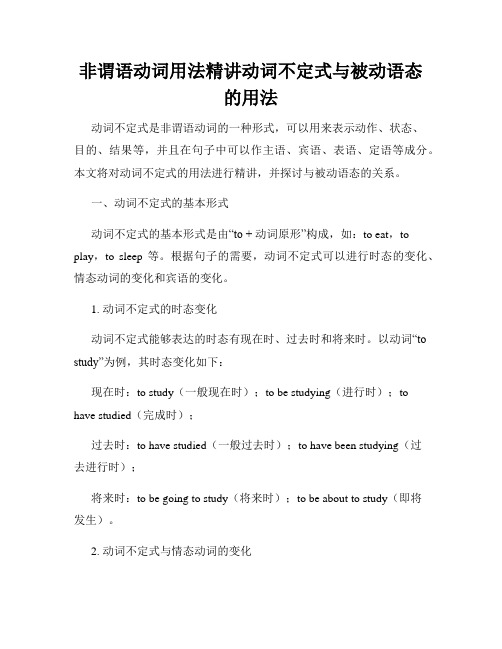
非谓语动词用法精讲动词不定式与被动语态的用法动词不定式是非谓语动词的一种形式,可以用来表示动作、状态、目的、结果等,并且在句子中可以作主语、宾语、表语、定语等成分。
本文将对动词不定式的用法进行精讲,并探讨与被动语态的关系。
一、动词不定式的基本形式动词不定式的基本形式是由“to + 动词原形”构成,如:to eat,to play,to sleep等。
根据句子的需要,动词不定式可以进行时态的变化、情态动词的变化和宾语的变化。
1. 动词不定式的时态变化动词不定式能够表达的时态有现在时、过去时和将来时。
以动词“to study”为例,其时态变化如下:现在时:to study(一般现在时);to be studying(进行时);to have studied(完成时);过去时:to have studied(一般过去时);to have been studying(过去进行时);将来时:to be going to study(将来时);to be about to study(即将发生)。
2. 动词不定式与情态动词的变化情态动词与动词不定式联用时,情态动词的形式保持不变,而动词不定式则仍保持原来的基本形式。
如:I can swim.(我会游泳。
)She must be careful.(她必须小心。
)He should apologize.(他应该道歉。
)3. 动词不定式作宾语动词不定式常常作为动词的宾语,说明动作或状态的对象。
常见的动词有want, hope, decide, plan, try, like等。
如:She wants to learn Chinese.(她想学中文。
)I hope to visit Beijing next year.(我希望明年去北京。
)4. 动词不定式作表语动词不定式还可以作表语,说明主语的身份、职业、爱好等。
如:Her dream is to be a teacher.(她的梦想是成为一名教师。
非谓语动词——不定式
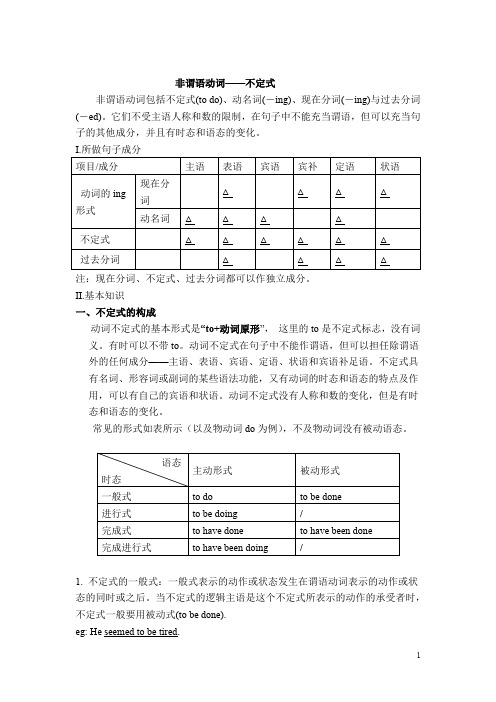
非谓语动词——不定式非谓语动词包括不定式(to do)、动名词(-ing)、现在分词(-ing)与过去分词(-ed)。
它们不受主语人称和数的限制,在句子中不能充当谓语,但可以充当句子的其他成分,并且有时态和语态的变化。
注:现在分词、不定式、过去分词都可以作独立成分。
II.基本知识一、不定式的构成动词不定式的基本形式是“to+动词原形”,这里的to是不定式标志,没有词义。
有时可以不带to。
动词不定式在句子中不能作谓语,但可以担任除谓语外的任何成分——主语、表语、宾语、定语、状语和宾语补足语。
不定式具有名词、形容词或副词的某些语法功能,又有动词的时态和语态的特点及作用,可以有自己的宾语和状语。
动词不定式没有人称和数的变化,但是有时态和语态的变化。
常见的形式如表所示(以及物动词do为例),不及物动词没有被动语态。
1. 不定式的一般式:一般式表示的动作或状态发生在谓语动词表示的动作或状态的同时或之后。
当不定式的逻辑主语是这个不定式所表示的动作的承受者时,不定式一般要用被动式(to be done).eg: He seemed to be tired.The building to be finished next month is for our teachers.2. 不定式的进行式:进行式表示动作正在进行,与谓语的动作同时发生。
e.g. When I went to his home, he happened to be traveling around the world.3. 不定式的完成式:如果不定式所表示的动作或状态发生在谓语动词所表示动作或状态之前,就用完成式;若是在此基础上的被动含义,就用完成被动式( to have been done).e.g. He is said to have written a novel about the Long March.He is said to have been taught French when he was a child.4. 不定式的完成进行式:如果不定式的动作是在谓语所表示的时间之前一直在进行或有可能继续进行的动作,就要用完成进行式.eg. We’re happy to have been working with the experts all the month.二、不定式的用法:1. 动词不定式做主语:不定式做主语一般表示具体的某次动作。
非谓语动词(不定式)的用法
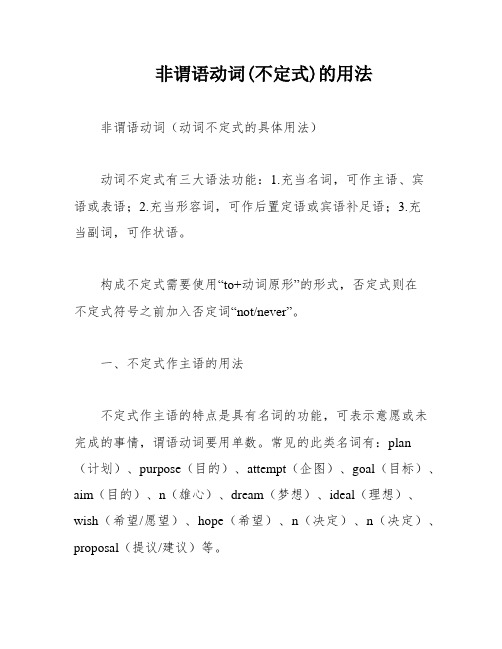
非谓语动词(不定式)的用法非谓语动词(动词不定式的具体用法)动词不定式有三大语法功能:1.充当名词,可作主语、宾语或表语;2.充当形容词,可作后置定语或宾语补足语;3.充当副词,可作状语。
构成不定式需要使用“to+动词原形”的形式,否定式则在不定式符号之前加入否定词“not/never”。
一、不定式作主语的用法不定式作主语的特点是具有名词的功能,可表示意愿或未完成的事情,谓语动词要用单数。
常见的此类名词有:plan(计划)、purpose(目的)、attempt(企图)、goal(目标)、aim(目的)、n(雄心)、dream(梦想)、ideal(理想)、wish(希望/愿望)、hope(希望)、n(决定)、n(决定)、proposal(提议/建议)等。
为了避免主语过长,不定式短语可放在句末,用形式主语“it”代替原来的主语位置,不定式则成为真正的主语。
例如:___.(赢得冠军是我的雄心。
)To master a foreign language is necessary.(掌握一门外语是有必要的。
)To e President of the United States used to be my goal.(过去我的梦想是成为美国总统。
)Speaking perfect English is always my dream.(说一口流利的英语一直是我的梦想。
)It is ___.(保护环境是有必要的。
)There are two special ___:1) It is + adj + of sb + to do sth.2) It is + adj + for sb + to do sth.___ characteristics and differences are:1) If ___ characteristics or traits。
the logical subject of the ___ "of."Examples:It is very affable of you to help me。
(完整)非谓语动词之不定式用法详解

(完整)非谓语动词之不定式用法详解定义动词不定式与动名词,分词一样是动词的一种非谓语形式,它与动词原形同行,但它前面一般带有一个不定式的符号“to”,我们为了把它与介词的to 区别开来,也叫它小品词,它只是一个符号,没有词性,但动词不定式有时也不带to 。
形式1. 不定式作名词的用法不定式在句子中的作用有时和名词相同,在句子中可以当主语,表语,宾语. it 作形式主语而将真正的主语(不定式短语)放在谓语之后。
例如:例2可变为It is important to obey the laws.例3可变为It is impossible to finish so much homework in a day. 常见的带形式主语it 的句型有:句型一:*It is easy (difficult , hard, important , right , wrong, possible, impossible, necessary , unnecessary, foolish , wise, kind , cruel , nice…) to do …句型二:It is a pleasure (pity , pleasant thing, crime, an honor… ) to do sth. 句型三:It takes (sb 。
) some time to do sth 。
花了某人一些时间去做某事 在句型一中我们常用for sb.或of sb 。
来做不定式的逻辑主语.但是什么情况下用for 或of ,主要从以下两个方面来区别: 1两者所使用的形容词不同a.for sb 。
的句型通常使用表示客观情况的形容词。
如easy, difficult, hard , important, possible, impossible , necessary , unnecessary, interesting 等。
·It is important for us to express our opinions 。
非谓语动词中的动词不定式和动名词用法详解

非谓语动词中的动词不定式和动名词用法详解动词不定式和动名词是非谓语动词的两种形式。
它们在句子中可以充当名词、形容词或副词,具有一定的独立性和灵活性。
本文将详细解释动词不定式和动名词的用法,并举例说明。
动词不定式用法:动词不定式一般由to + 动词原形构成,常用的用法有以下几种:1. 作主语:动词不定式作为句子的主语时,常放在句首,如:To learn English is important.(学习英语很重要。
)2. 作宾语:动词不定式可以作为及物动词的宾语,如:I want to go shopping.(我想去购物。
)3. 作表语:动词不定式可以作为主语后面的表语,如:Her dream is to become a doctor.(她的梦想是成为一名医生。
)4. 作定语:动词不定式可以修饰名词,常放在名词前面,如:Please give me something to eat.(请给我一些吃的。
)5. 作状语:动词不定式可以表示目的、原因、结果、方式等,如:He went to the library to borrow some books.(他去图书馆借书。
)6. 作补语:动词不定式可以作及物动词的宾语补足语,如:They made him apologize for his behavior.(他们要求他为自己的行为道歉。
)动名词用法:动名词是动词加-ing形式构成的名词,常用的用法有以下几种:1. 作主语:动名词可以作为句子的主语,如:Swimming is good exercise.(游泳是很好的锻炼。
)2. 作宾语:动名词可以作及物动词的宾语,如:I enjoy singing.(我喜欢唱歌。
)3. 作表语:动名词可以作为主语后面的表语,如:His hobby is playing basketball.(他的爱好是打篮球。
)4. 作定语:动名词可以修饰名词,常放在名词前面,如:I have a swimming lesson this afternoon.(我今天下午有一堂游泳课。
非谓语动词 之动词不定式(to do)的用法
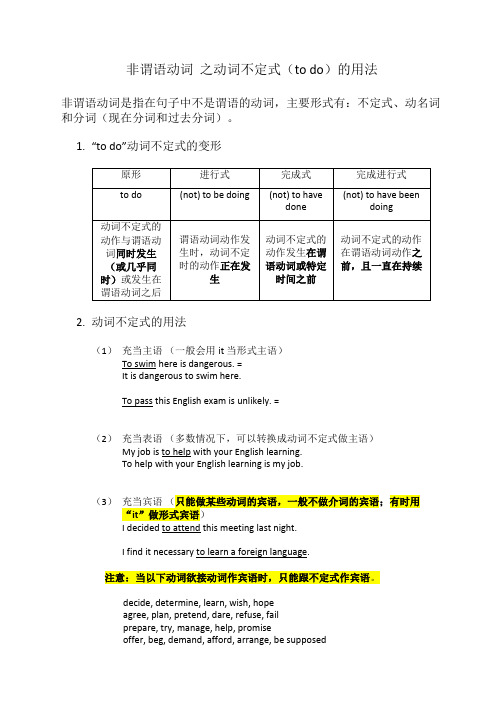
非谓语动词之动词不定式(to do)的用法非谓语动词是指在句子中不是谓语的动词,主要形式有:不定式、动名词和分词(现在分词和过去分词)。
1.“to do”动词不定式的变形2.动词不定式的用法(1)充当主语(一般会用it 当形式主语)To swim here is dangerous. =It is dangerous to swim here.To pass this English exam is unlikely. =(2)充当表语(多数情况下,可以转换成动词不定式做主语)My job is to help with your English learning.To help with your English learning is my job.(3)充当宾语(只能做某些动词的宾语,一般不做介词的宾语;有时用“it”做形式宾语)I decided to attend this meeting last night.I find it necessary to learn a foreign language.注意:当以下动词欲接动词作宾语时,只能跟不定式作宾语。
decide, determine, learn, wish, hopeagree, plan, pretend, dare, refuse, failprepare, try, manage, help, promiseoffer, beg, demand, afford, arrange, be supposed(4)充当宾语补足语I persuaded him to make a speech in public.注意:在感官动词/使役动词/help后(see, hear, watch, notice, make,have, let后不定式做宾补时,可省略“to”)I saw them have a disagreement on who should sweep the floor. (我看到了他们争论的整个过程)但,感官动词后面也可接Ving形式,表示正在进行。
不定式非谓语动词用法解析

不定式非谓语动词用法解析不定式是一种特殊的非谓语动词形式,它可以不受主语和时态限制地在句子中充当名词、形容词或副词。
在英语中,不定式通常由“to”加动词原形构成,形式为“to + 动词原形”。
一、作名词用法1. 作主语不定式作主语时,常用于句子的开头,并且常常需要用形式主语“it”来代替。
例如:To learn a foreign language is not easy.(学习外语并不容易。
)2. 作宾语不定式作及物动词的宾语时,常位于动词之后。
例如:I want to go shopping.(我想去购物。
)3. 作介词的宾语不定式可以作为某些介词的宾语,常用的介词有:for, about, after, before, without, etc.例如:Thank you for helping me.(谢谢你帮助我。
)二、作形容词用法1. 作后置定语不定式可以用来修饰名词或代词,放在被修饰的名词或代词之后。
例如:I have a book to read.(我有一本书要读。
)2. 作表语不定式可以作为系动词的表语。
例如:Her dream is to become a doctor.(她的梦想是成为一名医生。
)三、作副词用法1. 修饰动词不定式可以修饰动词,表示目的、结果或原因。
例如:He went to the supermarket to buy some groceries.(他去超市买了些杂货。
)2. 修饰形容词或副词不定式可以修饰形容词或副词,常用于句子中den 给出愿望、建议或批评的时候。
例如:She is too young to go to school.(她太小不能上学。
)四、特殊用法1. “动词 + 宾语 + 不定式”某些动词后面接宾语时,可以通过不定式的形式来表示宾语的动作或状态。
常见的动词有:ask, tell, want, wish, advise, encourage, allow, etc.例如:She asked me to help her.(她请我帮她。
非谓语动词之动词不定式的用法
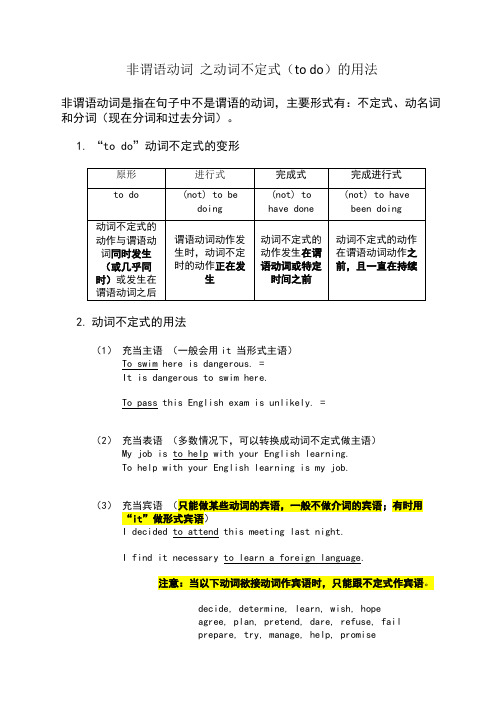
非谓语动词之动词不定式(to do)的用法非谓语动词是指在句子中不是谓语的动词,主要形式有:不定式、动名词和分词(现在分词和过去分词)。
1.“to do”动词不定式的变形2.动词不定式的用法(1)充当主语(一般会用it 当形式主语)To swim here is dangerous. =It is dangerous to swim here.To pass this English exam is unlikely. =(2)充当表语(多数情况下,可以转换成动词不定式做主语)My job is to help with your English learning.To help with your English learning is my job.(3)充当宾语(只能做某些动词的宾语,一般不做介词的宾语;有时用“it”做形式宾语)I decided to attend this meeting last night.I find it necessary to learn a foreign language.注意:当以下动词欲接动词作宾语时,只能跟不定式作宾语。
decide, determine, learn, wish, hopeagree, plan, pretend, dare, refuse, failprepare, try, manage, help, promiseoffer, beg, demand, afford, arrange, be supposed(4)充当宾语补足语I persuaded him to make a speech in public.注意:在感官动词/使役动词/help后(see, hear, watch, notice,make, have, let后不定式做宾补时,可省略“to”)I saw them have a disagreement on who should sweep the floor.(我看到了他们争论的整个过程)但,感官动词后面也可接Ving形式,表示正在进行。
非谓语动词用法详解不定式作定语
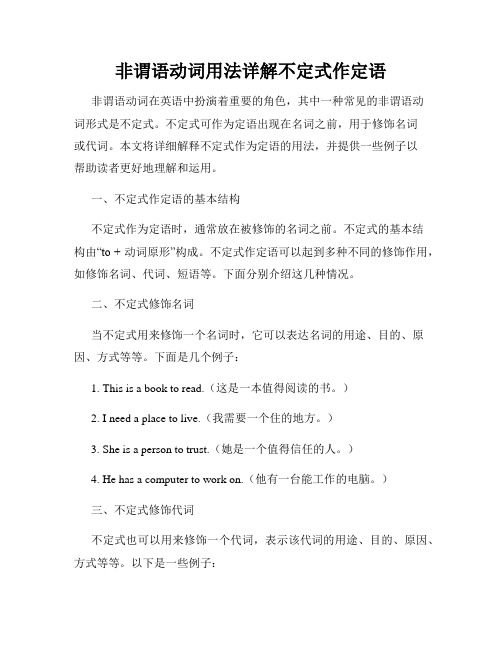
非谓语动词用法详解不定式作定语非谓语动词在英语中扮演着重要的角色,其中一种常见的非谓语动词形式是不定式。
不定式可作为定语出现在名词之前,用于修饰名词或代词。
本文将详细解释不定式作为定语的用法,并提供一些例子以帮助读者更好地理解和运用。
一、不定式作定语的基本结构不定式作为定语时,通常放在被修饰的名词之前。
不定式的基本结构由“to + 动词原形”构成。
不定式作定语可以起到多种不同的修饰作用,如修饰名词、代词、短语等。
下面分别介绍这几种情况。
二、不定式修饰名词当不定式用来修饰一个名词时,它可以表达名词的用途、目的、原因、方式等等。
下面是几个例子:1. This is a book to read.(这是一本值得阅读的书。
)2. I need a place to live.(我需要一个住的地方。
)3. She is a person to trust.(她是一个值得信任的人。
)4. He has a computer to work on.(他有一台能工作的电脑。
)三、不定式修饰代词不定式也可以用来修饰一个代词,表示该代词的用途、目的、原因、方式等等。
以下是一些例子:1. I have something to tell you.(我有事要告诉你。
)2. He needs someone to help him.(他需要有人帮助他。
)3. They are looking for a house to live In.(他们正在寻找一座住的房子。
)四、不定式修饰短语不定式还可以修饰一个短语或者从句,同样地,它表示这个短语的用途、目的、原因、方式等。
以下是一些例子:1. He came here to study English.(他来这里是为了学习英语。
)2. They left early to catch the train.(他们早点离开是为了赶火车。
)3. I need more time to finish my work.(我需要更多时间来完成我的工作。
非谓语动词的三种形式与用法

非谓语动词的三种形式与用法非谓语动词是指在句子中充当其他成分而不担任谓语的动词形式。
一般来说,非谓语动词有三种形式:不定式、动名词和分词。
它们在句子中有着不同的用法和功能。
下面将详细介绍这三种非谓语动词的形式与用法。
一、不定式不定式是动词的一种形式,它可以作为名词、形容词或副词的补语,也可以作为谓语的补语。
不定式一般由“to + 动词原形”构成。
1. 作为名词的补语不定式可以作为名词的补语,起到与名词相同的作用。
例如:- My dream is to travel around the world.(我的梦想是环游世界。
)- I have a lot of work to do.(我有很多事情要做。
)2. 作为形容词的补语不定式可以作为形容词的补语,修饰名词或代词。
例如:- She has a book to read.(她有一本要读的书。
)- I am happy to see you.(见到你我很高兴。
)3. 作为副词的补语不定式可以作为副词的补语,修饰动词、形容词或副词。
例如:- He ran fast to catch the bus.(他快速地跑去赶公交车。
)- I woke up early to prepare for the exam.(我早早醒来准备考试。
)二、动名词动名词是一种以-ing 结尾的动词形式,它可以作为名词的主语、宾语、定语、表语等。
1. 作为名词的主语动名词可以作为句子的主语,表示某种行为或概念。
例如:- Swimming is good exercise.(游泳是一项好的锻炼。
)- Reading books is my favorite hobby.(阅读书籍是我最喜欢的爱好。
)2. 作为名词的宾语动名词可以作为某些动词的宾语,表示被动或完成的动作。
例如:- I enjoy swimming in the sea.(我喜欢在海里游泳。
)- She hates doing household chores.(她讨厌做家务活。
非谓语动词不定式

非谓语动词不定式非谓语动词不定式是英语中的一种语法结构,它具有多种用法和形式,是英语学习中比较基础和重要的一部分。
本文将分步骤阐述非谓语动词不定式的常见用法和相关注意事项。
一、基本形式非谓语动词不定式是由“to”加动词原形构成的,例如:to go, to eat, to sleep等等。
不定式也可以省略to,形成动词原形作为不定式,例如:go, eat, sleep等等。
这种形式被称为“裸不定式”。
二、用法1. 作主语或宾语不定式可以作句子的主语或宾语,例如:To travel is my dream.(旅行是我的梦想)I want to learn English.(我想学英语)2. 作目的状语不定式可以表示谓语动词的目的或原因,放在句子末尾,例如:She went to the supermarket to buy some groceries.(她去超市购买一些杂货)I am here to help you.(我在这里帮助你)3. 作定语不定式可以作为修饰名词的定语,放在被修饰的名词后面,例如:The book to read is on the desk.(要读的书在桌子上)The woman to marry is very beautiful.(要结婚的女人很漂亮)4. 作状语不定式可以表示时间、条件、结果等状语,放在句子中合适的位置,例如:He hurried in order to catch the last bus.(他赶快走为了赶上最后一班车)If you want to succeed, you must work hard.(如果你想成功,你必须努力工作)三、注意事项1. 句子主谓一致性当不定式作主语时,不能决定谓语动词的人称和数,“to”后的动词原形保持不变。
例如:To dance is her favorite hobby.(跳舞是她最喜欢的爱好)To study abroad is their dream.(出国留学是他们的梦想)2. 可以与情态动词连用不定式可以加上情态动词,例如:I can swim.(我能游泳)She should study harder.(她应该更加努力学习)3. 可以与被动语态连用不定式也可以与被动语态连用,形成被动不定式。
(完整版)非谓语动词(不定式)的用法
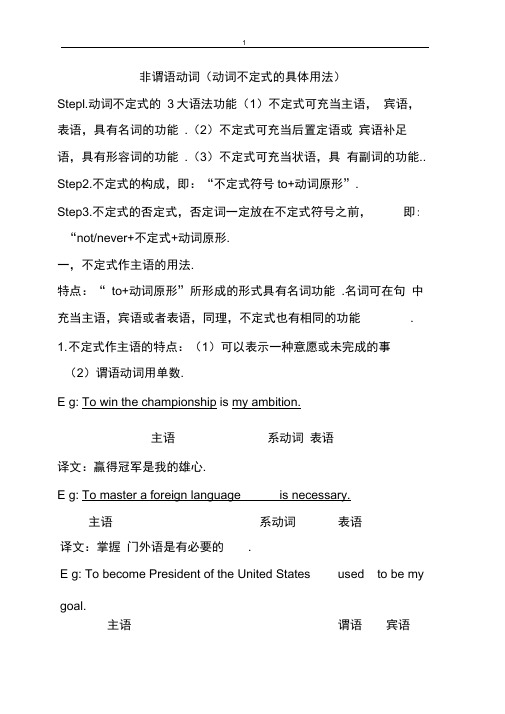
非谓语动词(动词不定式的具体用法)Stepl.动词不定式的3大语法功能(1)不定式可充当主语,宾语,表语,具有名词的功能.(2)不定式可充当后置定语或宾语补足语,具有形容词的功能.(3)不定式可充当状语,具有副词的功能.. Step2.不定式的构成,即:“不定式符号to+动词原形”.Step3.不定式的否定式,否定词一定放在不定式符号之前,即: “not/never+不定式+动词原形.一,不定式作主语的用法.特点:“ to+动词原形”所形成的形式具有名词功能.名词可在句中充当主语,宾语或者表语,同理,不定式也有相同的功能. 1. 不定式作主语的特点:(1)可以表示一种意愿或未完成的事(2)谓语动词用单数.E g: To win the championship is my ambition.主语系动词表语译文:赢得冠军是我的雄心.E g: To master a foreign language is necessary.主语系动词表语译文:掌握门外语是有必要的.E g: To become President of the United States used to be mygoal.主语谓语宾语译文:过去我的梦想是成为美国总统2. 不定式作主语时,be动词之后的表语若是名词,一定是表示意愿,目的,企图等名词,用来表示尚未完成的事情•常见的此类名词有:plan (计划),purpose (目的)‘attempt (企图),goal (目标),aim (目的),ambition (雄心),dream (梦想),ideal (理想),wish (希望/愿望),hope (希望),decision (决定)‘determination (决定)‘proposal (提议/建议).E g: To speak perfect English is always my dream主语系动词表语译文:说一口流利的英语一直是我的梦想3. 由于不定式短语作主语,显得主语过长,为了避免头重脚轻,达到句子平衡,把不定式短语放在句末,在原来主语的位置上“ it ”代替,形式上占一个主语的位置,称之为形式主语,不定式称为真正的主语.E g: It js _ necessary to protect the environment.形式主语系动词表语不定式作真正主语译文:保护环境是有必要的.4. 不定式作主语的两种特殊结构(1)句型:It is +adj(形容词)+of sb +to do sth.(2)句型:It is +adj(形容词)+for sb +to do sth.特点和区别:(1 )若形容词表示人的本质特征,特性,就用“ of ”引出的不定式的逻辑主语.A:表示人的本质特征和特性的形容词有:“good; nice; clever; wise; foolish; silly; stupid; rude; (im)polite , careless; careful; affable.E g: It is very affable of you to help me.译文:你真好帮助我.E g: It is very careless of you to lose your wallet.译文:你真粗心大意把钱包丢了.(2) 若形容词表示的不是逻辑主语的特性,而是描述对逻辑主语所做的事情,就用介词“ for ”,B:常见的此类形容词有:“ easy; hard; difficult; heavy; necessary; impossible; important.E g: It is impossible for me to get to the destination on time in an hour.译文:一个小时之内按时达到目的地对我来说是不可能的.E g: It is very difficult for me to work out the math problem.译文:解决这个数学问题对我来说太难了.(3) 形容词表示人的特性的句子可转化成一个不定式作状语的句子,而后者则不能.E g: It is very kind of you to help me with my English可转化为一个不定式作状语的句子=You are very kind to help me with my English.二,不定式作宾语的用法.(1)作及物动词的宾语,该及物动词均为表示意愿,企图的动词,表示具体的或者特定的动作,或者是将来的动作常见的动词如下:want (要);wish (希望);hope (希望);desire(欲望/渴望);intend意图;try (设法);determine (决定); decide (决定);attempt (企图);endeavor (努力);plan (计戈【J) ; like (喜欢);love (喜欢);expect (期望/盼望);pretend(假装);afford (承担得起);manage (设法);prepare (准备);long(盼望);arrange (安排);promise (答应/许诺);learn (学会);dare (敢);agree (同意);start/begin(开始);fail (失败); refuse (拒绝);等.E g: J ____ want to take a trip abroad next year.主语及物动词不定式作宾语时间状语译文:明年我要出国旅游.E g: J_ intend to visit you tomorrow主语及物动词不定式作宾语时间状语译文:我打算明天去拜访你.E g: He tried to kill two birds with one stone.译文:他设法一箭双雕.E g: I expect to get a raise.译文:我渴望获得加薪.E g: I_ can 'afford to buy a new car.主语及物动词动词不定式作宾语 译文:我买不起新车. (2)若作宾语的不定式太长,如果其后还有形容词或名词担 当宾语补足语,常用“ it ”作形式宾语,把不定式短语作真正的 宾语后置.基本句式:“主语+及物动词+it (形式宾语)+名词/形容词(宾语 补足语)+to+动词原形(真正宾语)”.常见的此类动词有 “find (发现);think (认为);believe (相信)E g: I deem it an honor for me to give this speech.译文:能在这里进行演讲我认为这是我的荣幸consider (认为) ;deem (认为) ;feel (觉得);make (使) E g: L think it_English well.主语 及物动词形式宾语真正的宾语译文:我认为学好英语是很有用的 useful to learn宾补不定式作E g: 1_deemnecessaryto others.主语及物动词形式宾语宾补 正的宾语to apologize不定式作真译文:我认为向别人道歉是有必要的E g: We found it impossible to finish the project in a month.主语及物动词形式宾语宾补不定式作真正的宾语译文:我发现一个月之内完成这个项目是不可能的E g: I make it a rule to get up early.说明:Make it a rule to+v表示“把 ---------- 当作常例/习惯于译文:我习惯早起.E g: The teacher made it. a rule to speak only English in class.主语及物动词形式宾语宾补不定式作真正的宾语地点状语.译文:老师规定在课堂上这能讲英语E g: I felt it stupid for him to talk like that.译文:我觉得他这样讲话挺愚蠢的.(3)疑问代词:“ what ; which; whom + 动词不定式(to+do )”共同作及物动词的宾语的用法特点:不定式后面的动词一定为及物动词,疑问单词“what ; which; whom ”及物动词或者介词的宾语.E g: J_ can 'decide which one to buy.主语及物动词共同作宾语译文:我决定不了买哪一个 E g: I don ' know what to do next. 译文:我不知道下一步该怎么办.E g: I can 'decide whom to turn to for help. 译文:我决定不了向谁求救.E g: I hardly know what to say to you. 译文:我简直不知道该对你说什么(4)疑问代词:“ what ; which; whom + 动词不定式(to+do ) 共同作及物动词直接宾语的用法译文:你能告诉我应该选哪门课程吗?(5) 疑问副词:“ when; where; how ; whether+ 动词不定式 (to+do ) ”共同作及物动词宾语的用法 特点:(1)不定式后面的动词可以为不及物动词 .(2)不定式后面的动词也可为及物动词,且后面有宾语 E g: He patiently showed me the computer.译文:他耐心地教我怎么使用电脑E g: He didn ' t ll me when to start.E g: Would you please tell me to take?主语及物动词 间接宾语 which course直接宾语how to operate主语 状语及物动词 间接宾语 直接宾语译文:他并没有告诉我什么时候出发.E g: I don' know whether to go or stay.译文:我不知道是走还是留E g: I just wonder where to spend the weekend.译文:我只是想知道该去哪里度过周末.E g: Life is long if you know how to live it.译文:若知如何使用,生命就会长久.三,不定式作表语的用法.特点:(1)主语均为表示:“意愿”或者“企图”的名词.(2)不定式作表语可换作主语.E g: His only wish at present is to sleep.主语时间状语系动词动词不定式作表语译文:他此刻唯一的愿望就是去睡觉.可转化为:To sleep is his only wish at present.E g: His goal is simply to become an excellent English teacher.主语系动词状语动词不定式作表语译文:他的目标就是当一名优秀的英语教师E g: His resolution is to become a great scientist.主语系动词动词不定式作表语译文:他的志愿时当一名伟大的科学家E g: My dream is to become a successful businessman. 译文:我的愿望是成为一名成功的商人 E g: The problem is to find a solution. 译文:问题是得找出一个解决办法.E g: Shaking one ' fist is to show one 'determination. 译文:挥拳头是显示一个人的决心E g: The purpose of yelling English is to build up your confidence. 译文:大喊英语的目的是建立你的自信心 不定式作表语的2种特殊情况(1) 动词不定式作主语,也可作 be 动词之后的表语,主语和 表语的动词形式一定要对称 E g: To see 不定式作主语 译文:眼见为实 E g: To love her this way译文:这样爱他就等于崇拜她(2) 在下列句型中,be 动词之后的to 可省略,接动词原形作 表语. E g: All you have to dois (to) take a good rest. 主语系动词表语is to believe系动词不定式作表语is to worship her. 不定式作主语 方式状语 系动词不定式作表语译文:你所要做的就是要好好的休息 E g: All I can do is 主语系动词(to) waitis表语译文 E g : :我所能做的就是等待 What you should dosimply(to) apologize tohim主语 系动词状语表语译文 :你应该做的事就是向他道歉四,不定式作后置定语的用法 •相当于形容词的功能• 特点:(1 )动词不定式作定语时一定要放在所修饰词的后面, 作后置定语.(2)动词不定式与所修饰的名词之间有动宾关系(3)不定式后面的动词为及物动词,若为不及物动词,一定 要加上相应的介词 a pile of homework to do宾语 不定式作后置定译文:今晚我有一大堆的作业要做 不定式作后置定语的特殊用法(1)不定式作后置定语可以等于关系代词作主语所引导的定 语从句.Eg: Lhave tonight.主语 及物动词 语时间状语.E g: 1_have no friendto advise me.主语谓语宾语不定式作后置定语等价于:I have no friend who can advise me.译文:我没有朋友可以给我忠告.(2)不定式作后置定语可以等于关系代词作宾语所引导的定语从句.E g: \_have no one to talk to主语谓语宾语不定式作后置定语等价于:I have no one whom I can talk to.译文:我没有人可以交谈.E g: There are many sights to see here.等价于:There are many sights which we can see here.译文:这里有很多的风景可看.(3)主动的不定式和被动不定式的区别.A:如果句子的主语是要做那件事的人,就用主动形式.B:如果句子的主语是要做的动作(或者是接受动作的人或事),就用被动式.E g: I have two coats to wash.E g: Two coats are to be washed.⑷在:“there be ”结构中的不定式可用主动式,也可用被动式,且意思一样.E g: There is an important thing to do tonight= There is an important thing to be done tonight.(5)不定式修饰序数词一定要放在其后.A : Li was the first to arrive.B: Really? That ' not like him. He' always the last one to arrive.A:李是第一个到的B:真的吗?那可不像他的作风,他总是最后一个到五,不定式作状语的用法.特点:不定式作状语多放在被修饰的动词,副词,和形容词之后.注意其逻辑主语必须和句子的主语保持一致.在句中充当状语,表示目的;结果或原因.(1) 不定式修饰动词的用法,一定置于该动词之后E g: We should do whatever we can to save them.主语及物动词宾语从句不定式作目的状语的用法译文:我们应该做些什么才能挽救他们呢.(2) 不定式修饰动词作目的状语的用法.特点:不定式作目的状语,通常置于动词之后,也可置于句首,用逗号与主语隔开.E g: You should work very hard to win the award.主语谓语状语不定式作目的状语等价于:To win the award, you should work very hard译文:为了要赢得这个奖项,你应该努力奋斗.E g: I 'do everything I can to help you.(目的)译文:我会竭尽全力帮你的•E g: You 're really very kind to sav so.(原因)译文:你这么说真是太好了.还有类似不定式短语有:(1)in order to+动词原形..即可放在句首,也可句末.(2) so as to+动词原形.只能放在句末.(3)only to;(4)too -------------- t o 太------ 而不能(3) with an eye to + 动名词.只能放在句中.(4)with a view to +动名词.只能放在句中.E g: He_ aot up early in order to catch the school bus.主语谓语不定式作目的状语译文:他早起的目的就是能搭上校车.(3)不定式修饰形容词,一般置于该形容词之后.特点:一般表示一种结果.E g: He. js_ able to do amazing things.主语系动词表语不定式作结果的用法译文:他能成就伟业.E g: He is apt to lie to me .主语系动词表语不定式作结果的用法.译文:他爱向我撒谎.E g: She was prepared to face the music.译文:她准备好面对后果.疯狂操练:I'm determined to conquer English.我决心攻克英文I'm determined to master pronunciation. 我决心攻克发音.I'm determined to speak good English. 我决心说好英语.I'm determined to become a grammar king. 我决心成为语法大王I'm determined to command a lot of words. 我决心掌握大量词汇.I'm determined to write beautiful articles. 我决心写出漂亮文章.I'm determined to communicate with the world. 我决心与全世界沟通.(4)不定式修饰副词,一定置于该副词之后.特点:一般表示一种结果.E g: He is old enough to go swimming alone.主语系动词表语状语(副词)不定式作结果的用法译文:他长大了,足以单独一个人去游泳.五,不定式作宾语补足语的用法.(1)具有使役动词意味的及物动词,加上宾语之后,要用不定式短语作宾语补足语.止匕类动词有: 1) cause/get 促使----- ;2) lead弓丨导---明:‘加上宾语之后,可接to引导的不定式短语,但此时to视为介词,接动名词作其宾语”;3) allow/permit允许------- 4) advise 劝告 ------ 5)persuade 说月艮------ 6) enable 使能够7)tell 告诉8) beg/ask 请求9) order 命令10) want/wish/expect/intend 期望11)force 迫使.12 ) encourage 鼓励.E g: The sad story caused him to cry.主语及物动词宾语不定式作宾语补足语译文:这个悲惨的故事使他哭了.E g: His timely help enabled me to finish the project in advance.主语及物动词宾语不定式作宾补时间状语译文:他及时的帮助使我能提前完成这个项目E g: They don' allow me to smoke in the office.主语及物动词宾语不定式作宾补地点状语译文:他们不允许我在办公室里吸烟.Eg: L ask my students to yell English every morning.主语及物动词宾语不定式作宾补时间状语译文:我要求我的学生每天早上都大喊英语.E g: My parents want me to become a great lawyer in thefuture.译文:我的父母希望我将来成为一位很棒的律师E g: The boss forces his staff to work like a dog for him.译文:老板强迫员工为他拼命干活E g: My teacher encouraged me to try again.译文:我的老师鼓励我再试一次.(2)使役动词或者是感官动词,动词不定式作宾语补足语“to ”要省略.巧记不定式作宾补省略“to ”的两大规则A :“注意让‘买客’听听看看这块表有啥感觉不带“土”B: 五看(see; watch; notice; observe; look at ); 三让(let; make; have);两听(hear; listen to ); 一感觉(feel); 一发现(find); 半个帮(help).1)感官动词,宾语补足语接原型动词,表示已发生的事实••若出现在被动语态中,“ to ”要还原.Eg: _ noticed a thief slip into my roomjust now.主语及物动词宾语省略不定式原型动词作宾补时间状语译文:我刚才注意一个贼溜进我的房间了.E g: I never heard him speak English.译文:我从未听过他说英语.E g: The man was seen to leave the accident* 被动语态中不定式要还原)译文:有人看见他离开事故现场.2)使役动词(make/ let/ have)的具体用法.{1} “ make ”的常见用法.若出现被动语态时“ to ”要还原.探make +宾语+宾补(形容词)E g: The news made me happy.主语及物动词宾语形容词从当宾语补足语.译文:这则消息使我很开心.探make+宾语+宾补(省略“ to ”的动词原形).疯狂操练E g: My mother made me walk the dog. My father made me sweep the floor. My grandmother made me wash the dishes. My gran dfather made me buy him cigarettes. Every one in me family made me do something yesterday. I really enjoy helping other people.译文:我妈妈让我去遛狗.我爸爸让我擦地板.我奶奶让我洗碗. 我爷爷让我给他买烟.昨天家里的所有人都让我干活了.我真的很乐意帮助他人.E g: These workers are made to work at least 18 hours each day.译文:这些工人被迫每天至少工作18小时.{2} “let”的用法.很少出现被动语态中.探 Let ' +动词原形. 让我们一起 -------------------- E g: Let ' have dinner together tonight. 译文: 让我们今晚一起吃晚饭.探 Let us +动词原形.让我们一起 ---------- E g: Let us help Tom clean the room. 译文: 让我们大家一起帮助汤姆打扫房间.探Let sb++动词原形.让某人做某事. E g: Let me help you.译文:让我来帮助你{3} “have ”的用法•很少出现被动语态中.探have +宾语(人/) +宾补(过去分词充当)表示:请某人做 某事 探have +宾语(物/) +宾补(过去分词充当) 表示:可以用来 主语的遭遇或经历,并不是故意让某事发生的特点:1)作宾语补足语的动词与宾语之间是被动关系 .2)该动作常不属于主语的动作.E g: Please have the boy taken to the station.译文:请找人把这男孩带到E g: The old man had his leg broken when he fell off the bike.hadyesterday主语使役动词 宾语 状语译文:我昨天理的发.my hair 过去分词作宾补cut时间译文:那老人从自行车上摔下来时把腿摔断了探have+宾语(人/)+宾补(动词原形)表示“让某人做某事”E g: The director had his assistant pick up some hot dogs for the meeting.译文:主管让他的助理为这次会议准备一些热狗探have+宾语(人/物)+宾补(动名词)表示:“让某人或某事不停地,或者一次又一次地进行某一动作.E g: He had us laughing all through. 译文:整顿饭期间他让我们笑个不停.六,不定式充当独立主格的用法.特点:不定式可以在句中充当独立成分,用来说明说话人的态度,对全句进行解释常见的有:“to be frank; to be honest; to tell the truth; to be blunt ”等E g: To tell the truth, I have no money with me today.译文:我今天一分钱也没有带.E g: To be frank, you need to lose weight.译文:坦白说,你真的需要减肥.E g: To be blunt, that ' a stupid idea.译文:老实说,这想法真愚蠢.七,原型不定式的特殊结构.下列为与原型不定式连用的特殊结构.这些结构经常出现在各类英语考试中,务必要牢记1) : do nothing but +动词原形. 除了——,无所事事.E g: He did nothing but eat all day.译文:他整天什么也不做,只是吃.分析步骤如下:第一步:句中的but可视为并列连词,连接对等且形态相同的词类did,即He did nothing but did --------- .第二步:我们知道do/does/did用于肯定句中,可视为强调性的助动词,之后要接动词原形.试比较:未强调前:He works hard. 他用功.强调后:He does work hard. 他的确很用功.第三步:因此,在He did nothing but did ------------ 中,did之后要接动词原形•即He did nothing but did eat all day.第四步:并列连词but之后相同的词类可以省略.本句中第一个did为不及物动词的一半过去时,而第二个did则为强调性的助动词,虽然性质不一,但外形相同,故第二个did可省略,即:“ He did nothing but eat all day ” .2) :Choose/expect/want/desire nothing but to+ 动词原形.E g: He wanted nothing but to sleep. 译文:他什么都不要,只想睡觉.3 ) : I have no choice but to+ 动词原形.除了——我别无选择.E g: I have no choice but to wait for the result.译文:除了等待结果我别无选择.4) : be interested in nothing but+ 动名词/名词. 除了——对什么也不感兴趣.E g: He is interested in nothing but singing.译文:他除了唱歌外,对什么都不感兴趣.5) enjoy nothing but+ 动名词/名词. 除了------ 对什么都不喜欢.E g: I enjoy nothing but dancing.译文:我除了跳舞外什么都不喜欢.6) cannot but+ 动词原形=cannot help/stop/ resist+ 动名词=cannot help but+ 动词原形.意思为:“不得不/忍不住------------ ”.E g: When I heard the story, I couldn ' but laugh/l couldn ' t help laughing/l couldn ' h e lp but laugh. 译文:我听至H这个故事,忍不住笑了出来.八,在下列含有to的动词短语中to是介词的有,注意:“介词后面要接名词、宾格代词、动名词”女口下:“ 1) be used to -------- 习惯于----- ;2) devote ---------- to献身于----- ;3 ) get down to ---------- 开始、着手------ ;4 ) look forward to——期望、期盼;5) object to——反对;6) be opposed to——反对;7) pay attention to -------------------- 注意、关注;8) stickto -------- ;9 ) apply--------- t o 集中精力、专注坚持10 )accustom ----- to 使习惯于;11) help on eself to 请随便------”等.E g: You should pay more attention to your health.译文:你应该多加注意身体.疯狂操练:You should pay more attention to your pronunciation. 你要多留意你的发音.You should pay more attention to your kids. 你要多留心你的孩子. You should pay more attention to your teeth. 你要多注意保护牙齿. You should pay more attention to your family. 你要多关心家人.You should pay more attention to your schoolwork. 你要多花心思在学业上.You should pay more attention to our environment. 我们应该多关注保护环境.E g: She applied herself to_ learning English.译文:她刻苦学习英语.E g: You must accustom yourself to getting up early译文:你必须习惯早起.E g: I 'e been looking forward to hearing from you.译文:我一直期望收到你的来信.疯狂操练:Help yourself to something to drink. 你自己随便喝点什么,另U 客气. Help yourself to something to eat.你自己随便吃点什么,别客气. Make yourself at home. 另U拘束.Sit down and relax for a while. 坐下来放松一下.My home is your home.我的家就是你的家.。
非谓语动词用法精讲不定式的用法和常见结构
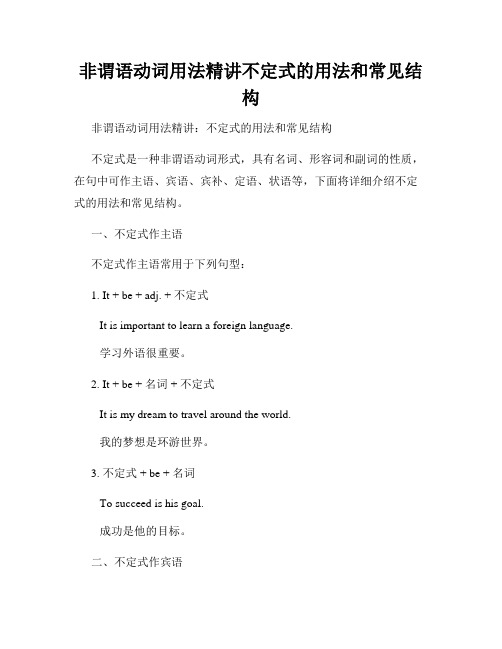
非谓语动词用法精讲不定式的用法和常见结构非谓语动词用法精讲:不定式的用法和常见结构不定式是一种非谓语动词形式,具有名词、形容词和副词的性质,在句中可作主语、宾语、宾补、定语、状语等,下面将详细介绍不定式的用法和常见结构。
一、不定式作主语不定式作主语常用于下列句型:1. It + be + adj. + 不定式It is important to learn a foreign language.学习外语很重要。
2. It + be + 名词 + 不定式It is my dream to travel around the world.我的梦想是环游世界。
3. 不定式 + be + 名词To succeed is his goal.成功是他的目标。
二、不定式作宾语不定式作宾语常用于下列动词后面:1. 希望类:hope, expect, want, wish, would like等I hope to see you soon.我希望很快见到你。
2. 决定类:decide, plan, choose, determine等They decided to go on a trip next week.他们决定下周去旅行。
3. 帮助类:help, teach, show, enable等My teacher taught me how to swim.我的老师教我游泳。
4. 开始类:begin, start, continue等He started to play the piano at the age of six.他六岁开始学习弹钢琴。
5. 喜欢类:like, love, enjoy, prefer等I prefer to stay at home on weekends.我周末更喜欢待在家里。
三、不定式作宾语补足语不定式作宾语补足语常用于使役动词后,表示被动或被迫的意义。
1. 使役动词:make, let, have, get等My father made me clean my room.父亲让我打扫了房间。
非谓语动词了解不定式动名词和分词的用法
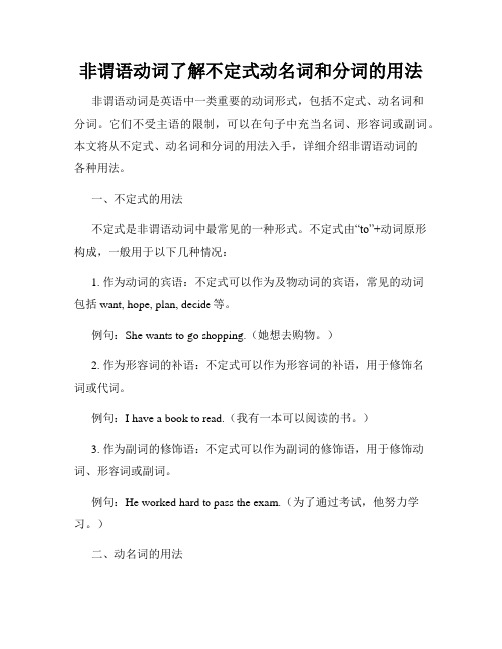
非谓语动词了解不定式动名词和分词的用法非谓语动词是英语中一类重要的动词形式,包括不定式、动名词和分词。
它们不受主语的限制,可以在句子中充当名词、形容词或副词。
本文将从不定式、动名词和分词的用法入手,详细介绍非谓语动词的各种用法。
一、不定式的用法不定式是非谓语动词中最常见的一种形式。
不定式由“to”+动词原形构成,一般用于以下几种情况:1. 作为动词的宾语:不定式可以作为及物动词的宾语,常见的动词包括want, hope, plan, decide等。
例句:She wants to go shopping.(她想去购物。
)2. 作为形容词的补语:不定式可以作为形容词的补语,用于修饰名词或代词。
例句:I have a book to read.(我有一本可以阅读的书。
)3. 作为副词的修饰语:不定式可以作为副词的修饰语,用于修饰动词、形容词或副词。
例句:He worked hard to pass the exam.(为了通过考试,他努力学习。
)二、动名词的用法动名词是将动词变为名词的形式,一般以“-ing”结尾。
动名词常见的用法有以下几种:1. 作为主语:动名词可以作为句子的主语,表示一种抽象的行为或状态。
例句:Swimming is good for health.(游泳对健康有益。
)2. 作为动词的宾语:动名词可以作为及物动词的宾语,表示动作的对象。
例句:I enjoy reading books.(我喜欢阅读书籍。
)3. 作为介词的宾语:动名词可以作为介词的宾语,常见的介词有for, about, of等。
例句:She is interested in learning English.(她对学习英语很感兴趣。
)三、分词的用法分词是非谓语动词中最灵活多样的一种形式,在句中可以作为形容词或副词使用。
分词有两种形式:现在分词(以“-ing”结尾)和过去分词(通常以“-ed”结尾)。
1. 作为形容词:分词可以修饰名词或代词,起到形容词的作用。
非谓语动词 之动词不定式(to do)的用法

非谓语动词之动词不定式(to do)的用法非谓语动词是指在句子中不是谓语的动词,主要形式有:不定式、动名词和分词(现在分词和过去分词)。
1.“to do”动词不定式的变形2.动词不定式的用法(1)充当主语(一般会用it 当形式主语)To swim here is dangerous. =It is dangerous to swim here.To pass this English exam is unlikely. =(2)充当表语(多数情况下,可以转换成动词不定式做主语)My job is to help with your English learning.To help with your English learning is my job.(3)充当宾语(只能做某些动词的宾语,一般不做介词的宾语;有时用“it”做形式宾语)I decided to attend this meeting last night.I find it necessary to learn a foreign language.注意:当以下动词欲接动词作宾语时,只能跟不定式作宾语。
decide, determine, learn, wish, hopeagree, plan, pretend, dare, refuse, failprepare, try, manage, help, promiseoffer, beg, demand, afford, arrange, be supposed(4)充当宾语补足语I persuaded him to make a speech in public.注意:在感官动词/使役动词/help后(see, hear, watch, notice, make,have, let后不定式做宾补时,可省略“to”)I saw them have a disagreement on who should sweep the floor. (我看到了他们争论的整个过程)但,感官动词后面也可接Ving形式,表示正在进行。
非谓语动词用法详解不定式作主语
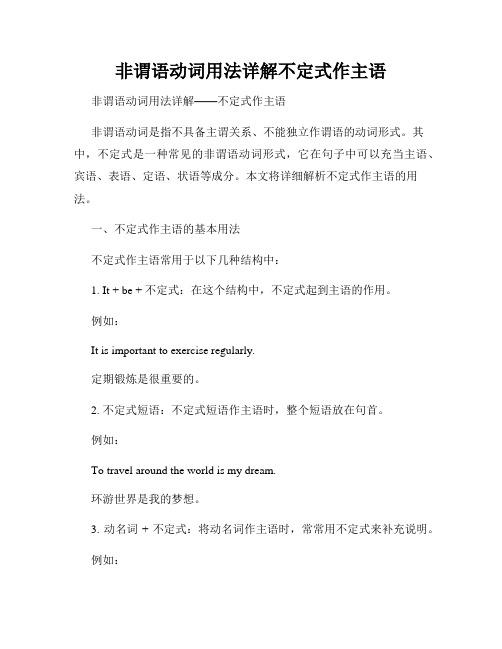
非谓语动词用法详解不定式作主语非谓语动词用法详解——不定式作主语非谓语动词是指不具备主谓关系、不能独立作谓语的动词形式。
其中,不定式是一种常见的非谓语动词形式,它在句子中可以充当主语、宾语、表语、定语、状语等成分。
本文将详细解析不定式作主语的用法。
一、不定式作主语的基本用法不定式作主语常用于以下几种结构中:1. It + be + 不定式:在这个结构中,不定式起到主语的作用。
例如:It is important to exercise regularly.定期锻炼是很重要的。
2. 不定式短语:不定式短语作主语时,整个短语放在句首。
例如:To travel around the world is my dream.环游世界是我的梦想。
3. 动名词 + 不定式:将动名词作主语时,常常用不定式来补充说明。
例如:Taking risks is the key to success.冒险是成功的关键。
二、不定式作主语的特殊用法1. 用于there be 句型There be 句型表示“存在某物”,当不定式短语作主语时,表示某物的存在。
例如:There is much work to do.有很多工作要做。
2. 用于情态动词情态动词后接不定式作主语,表示建议、要求、命令等含义。
例如:You should try to do your best.你应该尽力而为。
三、不定式作主语的注意事项1. 与谓语动词保持一致不定式作主语时,要与谓语动词的主语保持一致。
例如:To work hard is important. (单数主语)Working hard is important.(复数主语)2. 换位不定式在句子中,有时为了避免主语过长或句子结构累赘,可将不定式短语放在句尾。
例如:It is important to exercise regularly.(正常结构)To exercise regularly is important.(换位结构)3. 主谓一致性不定式作主语时,谓语动词的单复数形式根据不定式所表示的动作或状态而定。
非谓语动词不定式的用法

非谓语动词不定式的用法说到非谓语动词不定式,嘿,很多人就像看到了一只神秘的动物,眼神里流露出那种又爱又怕的感觉。
其实呢,这玩意儿并不复杂,反而可以说是英语里的一块宝地。
想象一下,咱们每天说话,表达想法,总少不了一些小小的“非谓语动词不定式”,那可是相当有用的哦!所以,今天咱们就来聊聊这位“明星”的用法,让它在你生活中闪耀光芒。
非谓语动词不定式最常见的用法之一就是表示目的。
就拿我自己来说吧,我每天起床的第一件事就是“to drink coffee”(喝咖啡),这可不是因为我特别爱咖啡,而是为了“to wake up”(醒来),没错,没咖啡,我可能还是个行尸走肉。
想象一下,如果我说“我喝咖啡”而不说“为了喝咖啡”,那就没意思了,听起来就像是在糊弄人。
要是你去参加派对,目的也是“to have fun”(好好玩一场),对吧?没事儿就去嗨,目的明确,人生充满乐趣。
不定式还可以用来表达某种想法或感觉。
比如,看到个小猫咪,我就会“to pet it”(去摸摸它),心里那种甜蜜的感觉,简直能融化冰山!这种表达方式能让你显得更有情感。
试想一下,跟朋友聊到喜欢的事情,咱们总会说“我想去旅行”而不是“我旅行”,这感觉就像是在描述心中那份向往。
非谓语动词不定式能把你内心的声音传递得淋漓尽致,让人感受到那份热情。
不定式还可以用作主语。
很多人可能觉得这有点怪,但其实就像我们说“to learn is fun”(学习很有趣)。
想想看,早上起来,心情特别好,想到“今天又可以学习新东西了”,那份期待感,简直让人飞起来!如果你跟别人说“学习很有趣”,听上去就像是在重复一遍,但说成“to learn is fun”,那才真是深入人心,让大家心里一亮。
此外,不定式还可以用作宾语,像“我喜欢看电影”就可以变成“我喜欢看电影”,用不定式表达出来就变得更有趣了。
说实话,看到好电影的时候,心里那种小激动,简直让人忍不住想分享。
用不定式说“我喜欢去看电影”,哇,这感觉就像是在传递一种使命感,让人迫不及待想一起去享受那种快乐。
- 1、下载文档前请自行甄别文档内容的完整性,平台不提供额外的编辑、内容补充、找答案等附加服务。
- 2、"仅部分预览"的文档,不可在线预览部分如存在完整性等问题,可反馈申请退款(可完整预览的文档不适用该条件!)。
- 3、如文档侵犯您的权益,请联系客服反馈,我们会尽快为您处理(人工客服工作时间:9:00-18:30)。
动词不定式的用法二、动词不定式充当的句子成分不定式具有名词、动词、形容词和副词的特性,在句中可以作主语、宾语、表语、定语、状语和宾语补足语。
(一)、作主语:1、不定式作主语多表示具体的、一次性的动作;动名词作主语多表示经常性的、习惯性的动作。
如:To swim today is a good idea Eating too much is bad for your health.2、不定式作主语时,常可以用it 作形式主语,而将真正的不定式主语后置。
但要熟记以下使用动名词作主语的句型:常用动名词作主语的句型有:It is/was +There is/was +更糟糕的)注意:There is no need for sb to do sth.2. 一般情况下,不定式作主语,谓语动词一般用单数形式。
如:To see is to believe.3. 当主语为不定式时,表语也用不定式来表示一致性。
如:To see is to believe.(二)、作宾语1、不定式作宾语通常表示具体的、一次性的动作。
如:Tom likes playing football, but he likes to play basketball today.但需要牢记以下的动词只使用v-ing 为宾语:avoid, miss, delay / postpone, suggest / advise, finish, practice, enjoy/appreciate, imagine, resist, admit, deny, envy, escape / envy, risk, pardon / excuse, keep / keep on, stand, mind;有些动词后面只能接不定式作宾语,如:decide/determine, learn, want, expect/hope/wish, manage, refuse, care, pretend, offer, promise, choose, plan, agree, ask/beg, help, wait, happen, afford, fail, threaten;有些动词短语后面也只能接动名词作宾语,如:lead to, get down to, look forward to, pay attention to, stick to,be addicted to, adjust/adapt to, devote to,object to,get to/be used to(习惯于),prefer…to…, can't stand(忍不住),give up,insist on,keep(on),put off,be worth,be/keep busy,have difficulty/trouble/problem(in),feel/look/seem like,set about,depend on,prevent sb. from,succeed in, thank you for, apologize for;有些动词后面既可以接不定式作宾语,又可以接动名词作宾语,如:continue,begin,start,prefer,like,love,hate,forget,go on,mean,regret,remember,stop,try,need, require, want 等。
2、不定式一般不作介词的宾语(但but/other than,except除外)。
如:I have no choice but to accept the fact.①如果此时谓语动词含有do的各种形式,不定式要省去to.I have done nothing except eat and sleep this week.I couldn't do anything but wait here.②在下列短语后,but之后只能跟不带to的不定式。
His father could do nothing but wait for the doctor to arrive.We would do anything but confess(承认)our guilty.我们决不承认有罪。
She couldn't help but laugh at his clothes.她情不自禁地大笑他的着装。
I cannot but admire(钦佩) his courage.I could not choose but love her.我不禁爱上了她。
3、有少数动词,如find,think,consider,make,feel等接不定式作宾语且其后面有宾语补足语时,常用it作形式宾语,而将真正的不定式宾语后置。
如:I think it better to start off right now.4、在动词hope, want, plan, expect, intend, mean, promise, wish的过去式之后用不定式的完成式作宾语,表示本来希望或打算做而未做的事,常可以与had + 这些动词ed + to do…结构互换。
如:I hoped to have met you at the airport, but I was too busy. = I had hoped to meet you at the airport, but I was too busy.(三)、作表语1、不定式作表语表示具体的、一次性的动作。
如:My job today is to water all the flowers in the garden.2. 注意主语和表语的一致性,当主语为不定式时,表语一般也用不定式:如:To see is to believe.注意:如果主语部分的谓语动词或非谓语动词中含有do,那么作表语的不定式可以省去to。
如:The only thing he could do was(to)tell the truth.(四)、作定语1、不定式作定语多表示未来的动作;2、不定式作定语常常放在它所修饰的词之后;如:There is nothing to worry about.3、不定式和分词作定语,用来说明被修饰词的动作,与被修饰词之间有逻辑关系(主谓或动宾关系);如:the way to do the work,the nurse to take care of the children4、常用不定式作定语的情况:(1) 当名词被the first,the last等序数词、形容词最高级或no,all,any等修饰时,常用不定式的一般式作定语,而不管动作是否已经完成。
如:He is the only person to know the truth.She is always the first to come and the last to leave.He has no right to do it.(2)不定式常用来修饰表示抽象意义的词,常见的有right(权利),ability,chance,answer, belief, reason, reply,attempt,key,way,moment,time, idea, fact, excuse, promise, 等。
如:Could you at least make an attempt to smile,Jim?(吉姆,你起码试着笑一笑,行吗?)Do you have the ability to read and write in English?5. 不定式作定语与被修饰的名词或代词之间常常构成的几种关系。
(1)逻辑主谓关系:不定式和它所修饰的名词或代词构成主谓关系。
如:He is the first person to come and the last one to leave.注意:此时不定式常常用主动形式。
(2)逻辑动宾关系:不定式和它所修饰的名词或代词构成动宾关系。
如:He has nothing to do.注意:A、此时要求不定式为及物动词(如果是不及物动词,或者不定式所修饰的名词或代词是不定式动作的地点、工具等,不定式后面必须有相应的介词,即“不及物动词+ 介词”);并且不定式常常也用主动形式。
如:He has nothing to do. There is nothing to worry about. The boy cried as he had no children to play games with. There is no room to live in. I haven't a pen to write with.B、不定式修饰名词time,place,way时,不定式后面的介词习惯上要省去。
如:He had no money and no place to live.(不是no place to live in)C、这种“动词不定式+ 介词”修饰名词/代词,可以转换成“介词+ 关系代词(which,whom)+ 不定式”。
如:Jim had only ten yuan to buy a present with.=Jim had only ten yuan with which to buy a present (3)同位关系:不定式与被修饰的名词或代词构成同位关系。
如:His wish to become an artist has never come true(五)、作状语1、不定式多作目的、结果、程度和原因状语。
如:She swept to hear the bad news.I’m very glad to hear the good news.He tried his best to arrive there only to find some waste paper.He is old enough to go to school.She is too tired to do the job.2、不定式作状语(多作目的、结果、程度和原因状语):(1)作目的状语(可以放在句首或句中,在句中作目的状语时一般不用逗号隔开):He stopped to have a rest.=To have a rest,he stopped.注意:in order to和so as to后面都可以接不定式作目的状语,但in order to可以放在句首或句中,而so as to则只能放在句中。
